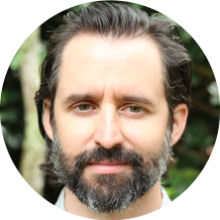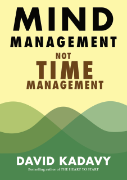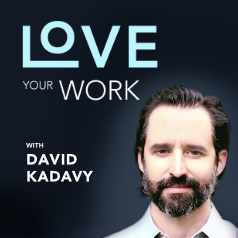Subscribe to blog updates via email »
Buy Mind Management, Not Time Management at kdv.co/mind – Love Your Work, Episode 243
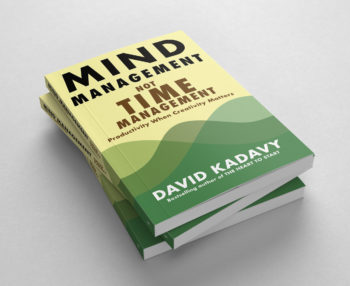 Today is the day! My new book, Mind Management, Not Time Management is now available everywhere! I’m very excited to share with you a cohesive system for managing your energy, instead of your time – to be productive when creativity matters.
Today is the day! My new book, Mind Management, Not Time Management is now available everywhere! I’m very excited to share with you a cohesive system for managing your energy, instead of your time – to be productive when creativity matters.
If you bought the Preview Edition of Mind Management, Not Time Management, I’ll be sending you the First Edition. Otherwise, go buy it today. In five years of this podcast, this is the single biggest event – this is my single biggest ask – go buy this book! It’s available wherever books are sold. Or go straight to Amazon.
I’m going to share with you a sample from the first chapter today.
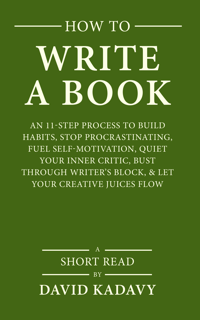
WANT TO WRITE A BOOK?
Download your FREE copy of How to Write a Book »
(for a limited time)
Listen to the Podcast
- Listen in iTunes >>
- Download as an MP3 by right-clicking here and choosing “save as.”
- RSS feed for Love Your Work
Chapter 1: Mind Management, Not Time Management
“There’s only twenty-four hours in a day.” The natural conclusion we’re supposed to draw from this common observation is: If there are only so many hours in a day, you should make the most of each of those precious hours. Time management, it seems, is critically important.
When you start managing your time, you find you really are getting more done. You’re keeping a calendar, so you don’t forget things. You’re building routines, so you can get repeating tasks done faster. You’re learning keyboard shortcuts for the apps you use every day. You may even start saying “no” to some opportunities, so you can make better use of your time.
But it becomes harder and harder to get more out of your time. Your calendar becomes jam-packed with a kaleidoscope of colored blocks. You start “speed reading,” and listening to audiobooks and podcasts on 3x speed. You start cutting out all but the most essential activities that move you toward your goals. No more lunches with your friends – you’ll eat at your desk.
Next, you figure, you can get more out of your time if you do two things at once. So you start multitasking. You’re checking your email while brushing your teeth. You’re holding conference calls while driving to work.
You start searching for extra bits of time, like loose change under couch cushions. You used to sleep eight hours a night, but now you’ll sleep five. You can check emails at family dinners. You can steal a couple extra hours of work on your laptop after everyone in the house has gone to bed.
You’re tired all the time. It seems there’s not enough coffee in the world to keep you going. Your anxiety levels are sky-high, and you’re becoming forgetful. You’re always in a rush.
With each new tactic you learn, each new “life hack,” each new shortcut, life gets more hectic. You would start outsourcing some of the load, but you’re so busy and so exhausted, you can’t even explain what’s keeping you so busy. The harder you try to get more out of your time, it seems, the less time you have. Even if you did have the time, you still wouldn’t have the energy.
Until one day you realize: “There’s only twenty-four hours in a day.” Maybe that doesn’t mean what I thought it meant?
I thought it meant I should get the most done in the least amount of time possible.
What I’m learning is, if there’s only twenty-four hours in a day, that means there’s a limit.
I can only get so much out of my time. “Time management” is like squeezing blood from a stone.
This story is not too different from my own. For my entire adult life, I have been a productivity enthusiast, with time management as one of my key strategies for getting more done. It started in college. As a graphic design student, I learned all the keyboard shortcuts I could for Photoshop. I used training software to teach myself to type faster. When I graduated and got a job, I constantly experimented with different ways of keeping a to-do list and prioritizing my tasks. I pontificated with any colleague who would listen about how to cut down on the number of emails in my inbox. One thing I loved about working in Silicon Valley was that there was no shortage of tech geeks with whom I could swap tips on the latest productivity apps.
Eventually, I ran out of ways to get more done in less time, and my quest went on a detour. That led me to embark on the adventure I’m sharing in this book.
Four years ago, I found myself sitting on the bare hardwood floor of my apartment in Chicago, eating lunch from a takeout container with a plastic fork. I had no furniture, no plates, no silverware. I had sold my last chair to some guy from Craigslist fifteen minutes prior.
I was about to embark on my most audacious productivity experiment yet. As I looked around at the three suitcases which housed my final remaining possessions, and the painters erasing from the walls any trace that I had lived there for seven years, I was trying to wrap my head around one fact: That night, I would fall asleep in another country. For the foreseeable future, I would be a foreigner – an extranjero – in a land with a checkered history, where I barely spoke the language.
It all started, six years earlier, with an email. It was the kind of email that would trip up most spam filters. I wasn’t being offered true love, millions of dollars from an offshore bank account, or improved performance in bed. I was being offered a book deal.
I had never thought of myself as a writer. In fact, I hated writing as a kid. As I considered accepting that book deal offer, every author I talked to warned me that writing a book is extremely hard work, with little chance of success. But I figured, How hard can it be?, and signed my first literary contract.
I didn’t know how to write a book, but the most obvious method was: time management. I needed to make sure I had the time to write the book.
In an attempt to meet my tight deadline, I used every time management technique I could think of. I scheduled writing sessions on my calendar. I developed a morning routine to start writing as quickly as possible after waking up. I “time boxed,” to limit the time I would spend on pieces of the project.
Still, I didn’t have enough time. I fired my clients. I cancelled dates and turned down party invitations. I started outsourcing my grocery shopping, my meal preparation, even household chores. If there was anything I had to do myself, I made sure to “batch” it into blocks of time when I could do it all at once.
Writing the book became my one and only focus. I cleared away any time I could, and I dedicated it to writing.
But it still wasn’t enough. I spent most of my day hunched over my keyboard, rocking back and forth in agony. I felt actual physical pain in my stomach and chest. My fingers felt as if they had been overtaken by rigor mortis. I struggled to write even a single sentence. I was spending plenty of time on my book, but I wasn’t getting anything done.
My case of writer’s block was so bad that, weeks after signing my contract, I accepted a last-minute invitation to go on a retreat to Costa Rica. Logically, it wasn’t the best use of my time, but I desperately hoped that a change of scenery would work some kind of magic.
A few days into the trip, I was more worried than ever. According to my contract, if my manuscript wasn’t twenty-five percent finished within a few weeks, the deal was off. Yet I still hadn’t written a single word. Unless a miracle happened, I would write a check to the publisher to return my advance, and I would humiliatingly face my friends, family, and blog readers to tell them I had failed. Does that sound like a lot of pressure? It was.
I went for a walk, so I could feel sorry for myself, by myself. I was dragging my feet down the gravel road, head hung down and arms crossed over my chest. How could I be so foolish?, I wondered. Not only had I committed to writing a 50,000-word book – with detailed illustrations – despite having little writing experience beyond a few blog posts, but I had wasted time and money going on this retreat.
Then, I heard someone call out. I looked up, and on the next road over was a man waving and yelling, ¿¡Como estáááás!? I had briefly noticed the man moments before. His fists had been wrapped around the simple wires of a fence, his arms stretched out in front of him as he leaned back in ecstasy, singing to himself. I had felt vaguely embarrassed for him, assuming he didn’t know someone else was around.
As the man motioned for someone to come to him, I hesitated. It looked as if he was motioning to me, but that seemed unlikely. Yet I looked around, and saw nobody.
I had just passed a fork in the road, and the fence the man stood behind was on the other side of the fork. I didn’t want to backtrack, because I felt I should return to the house and try to write. But I felt rude for ignoring his friendly invitation. So, I reluctantly retraced my steps, and walked over to the man, still unsure of what he wanted.
What followed was the first conversation I ever had entirely in Spanish. Though, I’m using the word “conversation” loosely. The man – Diego was his name – taught me the words for the sun, the beach, the rain and the sea. It turned out Diego just wanted to chat.
My conversation with Diego was refreshing. I was used to everyone ignoring each other on the crowded streets of Chicago, but here was a man who wanted to talk to someone on the next road over about nothing in particular. I was suddenly in such a relaxed state of mind that, after bidding Diego farewell, it was several minutes before I noticed I was going the wrong way. I had continued down Diego’s side of the fork in the road. When I realized this, I panicked at the prospect of getting lost in a foreign country, but then I shrugged it off and decided to keep going. It turned out I got back to the house just fine anyway.
Between the pep talk I got from my friend Noah Kagan – as described in my book, The Heart to Start – and my conversation with Diego, I felt as if I had turned over a new leaf. I set my laptop on a desk on the interior balcony of the house. There, looking out at the sapphire blue Pacific Ocean, I had my first breakthrough writing session. What once seemed impossible, now seemed easy. After an hour of writing, I had most of a chapter drafted. It suddenly seemed as if I might make my deadline after all.
That random conversation on a gravel road in Costa Rica became the seed of an idea that would eventually drive me to sell everything I owned and buy a one-way ticket to South America.
I had discovered that making progress on my first book wasn’t so much about having the time to write. It was about being in the right state of mind to do the work at hand. I had discovered that today’s productivity isn’t so much about time management as it is about mind management.
Mind Management, Not Time Management now available!
After nearly a decade of work, Mind Management, Not Time Management is now available! This book will show you how to manage your mental energy to be productive when creativity matters. Buy it now!
My Weekly Newsletter: Love Mondays
Start off each week with a dose of inspiration to help you make it as a creative. Sign up at: kadavy.net/mondays
Join the Patreon for (new) bonus content!
I've been adding lots of new content to Patreon. Join the Patreon »
Subscribe to Love Your Work
Listen to the Podcast
- Listen in iTunes >>
- Download as an MP3 by right-clicking here and choosing “save as.”
- RSS feed for Love Your Work
Theme music: Dorena “At Sea”, from the album About Everything And More. By Arrangement with Deep Elm Records. Listen on Spotify »
